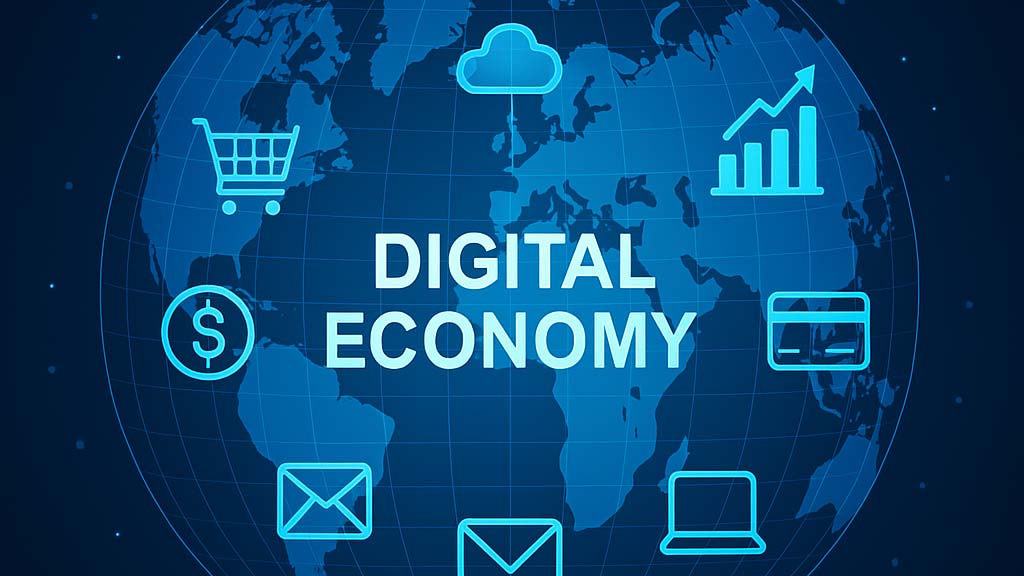Mauritius, a jewel in the Indian Ocean, has long been celebrated for its vibrant tourism sector, robust financial services, and burgeoning textile industry. However, recent economic challenges—exacerbated by global crises, supply chain disruptions, and a heavy reliance on traditional sectors—have strained the nation’s economy. With unemployment rising, foreign exchange reserves under pressure, and the lingering effects of the COVID-19 pandemic, Mauritius faces a critical juncture. Yet, amidst these challenges lies a transformative opportunity: the digital economy. By strategically harnessing digital technologies, fostering innovation, and building a resilient digital ecosystem, Mauritius can not only recover but also redefine its economic trajectory for the 21st century. This article explores actionable strategies to leverage the digital economy to revitalize Mauritius, drawing on global best practices while addressing the nation’s unique context.
The Current Economic Landscape in Mauritius
Mauritius has historically enjoyed economic stability, with a GDP per capita among the highest in Africa. Its economy thrives on tourism (contributing nearly 25% to GDP pre-COVID), financial services, and manufacturing. However, the global pandemic decimated tourism, with arrivals dropping by over 80% in 2020, triggering a ripple effect across hospitality, transport, and retail. The Wakashio oil spill in 2020 further damaged the island’s environmental and tourism appeal, while global inflation and supply chain disruptions have increased import costs for this import-dependent nation.
As of 2025, Mauritius faces a sluggish recovery. Unemployment, particularly among youth, remains high at around 9%, and the fiscal deficit has widened due to increased public spending to cushion the crisis. The Mauritian rupee has depreciated, straining foreign reserves, and traditional sectors struggle to regain pre-crisis momentum. These challenges underscore the need for economic diversification and resilience—qualities the digital economy can deliver.
The Promise of the Digital Economy
The digital economy encompasses economic activities driven by digital technologies, including e-commerce, digital services, fintech, remote work, and data-driven innovation. Globally, it contributes significantly to GDP—15-20% in advanced economies—and is projected to grow rapidly in developing nations. For Mauritius, the digital economy offers a pathway to diversify revenue streams, create jobs, and enhance global competitiveness. Key advantages include:
- Low Capital Barriers: Digital businesses require less physical infrastructure than traditional industries, making them accessible to small and medium enterprises (SMEs).
- Global Reach: Digital platforms enable Mauritian businesses to access international markets without geographic constraints.
- Job Creation: The digital economy can absorb skilled youth, reducing unemployment and brain drain.
- Resilience: Digital services are less vulnerable to physical disruptions like pandemics or natural disasters.
Mauritius is well-positioned to capitalize on this opportunity. The nation boasts a 98% literacy rate, a multilingual workforce (fluent in English, French, and Creole), and robust ICT infrastructure, with 4G coverage across the island and 5G rollout underway. Its time zone (GMT+4) aligns favorably with Europe, Africa, and Asia, facilitating remote work and outsourcing. However, unlocking the digital economy’s potential requires strategic interventions across policy, infrastructure, skills, and innovation.
Strategies to Boost the Mauritian Digital Economy
1. Strengthening Digital Infrastructure
A robust digital backbone is essential for a thriving digital economy. While Mauritius has made strides in connectivity, gaps remain in affordability, rural access, and cybersecurity. To address these:
- Expand Affordable High-Speed Internet: Subsidize broadband for low-income households and rural areas to ensure universal access. Partner with private telecoms to accelerate 5G deployment, prioritizing industrial hubs and innovation zones.
- Build Data Centers: Incentivize private investment in local data centers to support cloud computing and reduce reliance on foreign servers. This can position Mauritius as a regional data hub, attracting tech firms.
- Enhance Cybersecurity: Develop a national cybersecurity framework to protect businesses and consumers from cyber threats. Establish a Cybersecurity Agency to monitor threats, conduct training, and enforce compliance.
By investing in infrastructure, Mauritius can create an enabling environment for digital businesses, from startups to multinationals.
2. Fostering a Digital Entrepreneurial Ecosystem
SMEs form the backbone of the Mauritian economy, but many lack the resources or knowledge to transition online. To nurture digital entrepreneurship:
- Launch a Digital Transformation Fund: Provide grants and low-interest loans to SMEs for adopting e-commerce platforms, digital marketing, and cloud-based tools. For example, a textile SME could use funding to sell products on global marketplaces like Etsy or Amazon.
- Establish Innovation Hubs: Create tech incubators in Port Louis, Ebene, and secondary towns to support startups. These hubs can offer mentorship, co-working spaces, and access to venture capital. Focus on sectors like fintech, agritech, and edtech, which align with Mauritius’ strengths.
- Simplify Business Regulations: Streamline licensing and tax processes for digital businesses. Introduce a “Digital Sandbox” where startups can test innovative products (e.g., blockchain-based financial services) with regulatory flexibility.
These measures can empower entrepreneurs to innovate, scale, and compete globally, driving economic growth.
3. Upskilling the Workforce for a Digital Future
The digital economy demands skills in coding, data analytics, digital marketing, and AI. While Mauritius has a strong education system, its workforce needs targeted upskilling to meet industry demands. Key actions include:
- Integrate Digital Skills in Education: Revise school curricula to include coding, robotics, and digital literacy from primary levels. Partner with tech firms to offer internships and certifications.
- Launch National Reskilling Programs: Create free or subsidized online courses in high-demand skills like web development, cybersecurity, and cloud computing. Platforms like Coursera or local universities can deliver these programs.
- Promote Freelancing and Remote Work: Train youth to leverage platforms like Upwork and Fiverr, enabling them to earn foreign currency through global gigs. Mauritius’ multilingual workforce can target francophone and anglophone markets.
By equipping its people with digital skills, Mauritius can reduce unemployment and position itself as a talent hub for remote work and outsourcing.
4. Promoting E-Commerce and Digital Trade
E-commerce is a cornerstone of the digital economy, offering SMEs access to global consumers. Mauritius’ e-commerce sector is nascent but growing, with platforms like MyCart.mu gaining traction. To accelerate growth:
- Develop a National E-Commerce Strategy: Facilitate cross-border e-commerce by harmonizing customs processes and reducing trade barriers. Negotiate digital trade agreements with African and Asian markets.
- Support Local Platforms: Provide tax incentives to homegrown e-commerce platforms to compete with global giants. Encourage integration with local payment gateways like Juice by MCB.
- Enhance Logistics: Invest in last-mile delivery infrastructure to support e-commerce growth. Partner with logistics firms to create shared warehousing for SMEs.
By fostering e-commerce, Mauritius can boost exports, particularly in niche products like artisanal goods, spices, and eco-friendly fashion.
5. Leveraging Fintech to Drive Financial Inclusion
Mauritius’ financial services sector is a regional leader, but fintech adoption lags. Fintech can enhance financial inclusion, streamline transactions, and attract investment. Strategies include:
- Promote Mobile Payments: Expand mobile money solutions like MyT Money to reach unbanked populations, particularly in rural areas. Encourage interoperability among payment providers.
- Support Fintech Startups: Create a fintech regulatory sandbox to test innovations like digital lending, blockchain, and insure-tech. Attract global fintech firms to Mauritius’ financial hub.
- Digitize Government Services: Implement blockchain-based systems for transparent public financial management, reducing corruption and improving efficiency.
Fintech can empower marginalized communities, boost SME financing, and reinforce Mauritius’ reputation as a financial hub.
6. Positioning Mauritius as a Regional Digital Hub
Mauritius’ strategic location and business-friendly environment make it an ideal gateway to Africa. By branding itself as a digital hub, it can attract foreign investment and talent. Actions include:
- Market Mauritius Globally: Launch a “Digital Mauritius” campaign to attract tech multinationals and remote workers. Offer tax holidays for tech firms establishing regional headquarters in Mauritius.
- Strengthen Regional Connectivity: Leverage submarine cables (e.g., SAFE and METISS) to offer low-latency connectivity to Africa and Asia. Position Mauritius as a hub for digital services outsourcing.
- Foster Pan-African Collaboration: Partner with African tech ecosystems (e.g., Kenya’s Silicon Savannah) to co-develop solutions for agriculture, health, and education. Join the African Continental Free Trade Area’s (AfCFTA’s) digital trade protocol to access 1.4 billion consumers.
By positioning itself as a digital leader, Mauritius can diversify its economy and reduce dependence on traditional sectors.
Overcoming Barriers to Success
While the digital economy holds immense potential, Mauritius must address challenges to ensure success:
- Digital Divide: Bridge disparities in access and literacy through targeted subsidies and community tech centers.
- Regulatory Gaps: Update laws to govern data privacy, intellectual property, and digital transactions, balancing innovation with flexibility.
- Funding Constraints: Mobilize private investment and international aid to finance digital initiatives, given fiscal pressures.
- Global Competition: Differentiate Mauritius through niche offerings, such as sustainable tech or multilingual services, to stand out in a crowded market.
Strong political will and public-private partnerships will be essential to overcome these barriers.
A Vision for the Future
Imagine a Mauritius where a young entrepreneur in Mahébourg launches a global e-commerce brand, a farmer in Flacq uses AI to optimize crop yields, and a coder in Rose Hill earns a living serving clients in Paris. This vision is within reach if Mauritius embraces the digital economy with boldness and foresight. By investing in infrastructure, skills, and innovation, the nation can transform its economic narrative from crisis to opportunity, creating jobs, fostering resilience, and securing prosperity for all its citizens.
The digital economy is not a panacea, but it is a powerful catalyst. As Mauritius navigates its current economic challenges, the digital frontier offers a beacon of hope—a chance to reimagine the island’s future as a vibrant, inclusive, and globally connected nation. The time to act is now. Let’s seize this moment to build a Digital Mauritius that shines as brightly as its shores.
In crisis lies opportunity: Mauritius can transform its economy by embracing the digital frontier, fostering innovation, and connecting globally.
In the face of economic challenges, Mauritius stands at a pivotal moment where crisis sparks opportunity. By embracing the digital economy, the nation can diversify its industries, empower its youth, and forge a resilient future.
Through innovation, robust digital infrastructure, and global connectivity, Mauritius can transform its shores into a vibrant hub of opportunity, ensuring prosperity for all its people in a rapidly evolving world.






This article is exactly what I needed! Your insights are incredibly helpful.
I’m happy to hear you find value in my content. Thanks for your continued support!
You’ve changed the way I think about this topic. I appreciate your unique perspective.